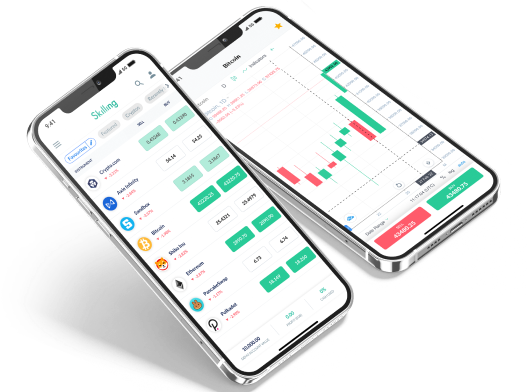In trading and investment, financial ratios play an essential role in decision-making. These ratios provide a snapshot of a company's financial health, offering insights into its performance and potential risks. Understanding these ratios is key for traders looking to make informed investment choices, offering detailed insights into its economic situation or balance. These ratios, when compared over time, provide concrete answers about a company's management effectiveness, allowing for more efficient decision-making and adaptation to changes.
Experience Skilling's award-winning platform
Try out any of Skilling’s trading platforms on the device of your choice across web, android or iOS.

What are financial ratios?
Think of financial ratios like a health checkup for a company. We get these numbers from a company's financial reports, which include details about their money, debts, and earnings. They are used to evaluate various aspects of a company's financial health, such as its liquidity, profitability, solvency, and operational efficiency.
There are different types of ratios, each telling us something unique about the company:
- Cash ratios: Measure a company's ability to pay off its short-term liabilities with its cash and cash equivalents. It's calculated by adding available cash and quickly realizable assets, then dividing by current liabilities. A ratio equal to or greater than 1 indicates the company can meet its short-term debts.
- Debt ratios: The debt ratio serves as a fundamental metric for assessing the financial health of individuals and businesses alike. It provides insights into the extent to which borrowed funds contribute to an entity's overall capital structure.
- Liquidity ratios: This ratio assesses whether a company can cover its short-term obligations. It's calculated by adding cash on hand, receivables, and inventories, and then dividing by short-term and long-term liabilities.
- Profitability ratios: Key profitability ratios include EBIT (Earnings Before Interest and Taxes), EBITDA (Earnings Before Interest, Taxes, Depreciation, and Amortization), ROE (Return on Equity), ROI (Return on Investment), ROA (Return on Assets), and the ratio of profitability on total capital.
- Equity ratios: A financial metric that measures the proportion of equity financing in a company's capital structure. It is calculated by dividing the total equity of a company by its total assets.
Why are they important for traders?
Financial ratios are like key clues for traders – they help in understanding a company's financial story and making smart investment choices. Here's why they are so important:
- Making informed choices: These ratios give traders a clear picture of how well a company is doing with its money, which helps them decide if it's a good idea to invest in that company.
- Easier comparisons: They make it easy to compare different companies and see which ones are doing well and which ones might be struggling, even if those companies are very different in size or type.
- Spotting risks: Financial ratios can act like warning signals. They can show if a company has too much debt or if it's not making enough money to cover its expenses. This helps traders avoid investing in companies that might be too risky.
- Watching trends: Watching financial ratios over time helps traders understand where a company might be going in the future. Are they improving and growing, or are they facing more challenges? This helps traders make decisions about long-term investments.
- Understanding market opinions: Financial ratios can also give traders a sense of what other investors think about a company. If a lot of people believe a company will do well in the future, it might be reflected in some of the ratios. This can influence the company's stock price and help traders decide if it's a good time to buy or sell.
- Guiding investment strategy: For traders, financial ratios are like a map that guides their investment journey. By understanding these ratios, traders can develop strategies that match their goals, whether they're looking for quick profits or long-term growth.
FAQs
1. Can financial ratios predict a company's future performance?
While they provide insights into a company's current financial health, financial ratios should be used alongside other analyses for predicting future performance.
2. How often should financial ratios be analyzed for effective trading?
Regular analysis, such as quarterly or annually, is recommended to keep track of a company's financial trends and health.
3. Are financial ratios equally important for all types of companies?
Yes, they are crucial for all companies, but the significance of specific ratios may vary depending on the industry and company size.
4. Are financial ratios alone sufficient for investment decisions?
They are essential but should be combined with other market research and analyses.













